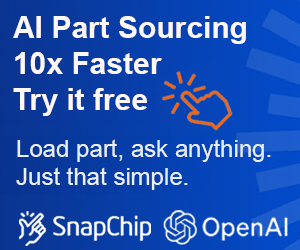Nurturing a Workforce Ready for AI Integration in Manufacturing
By Arjun Chandar, Founder and CEO of IndustrialML, Inc.
Integrating AI systems is no longer a luxury but an absolute necessity for staying competitive in the manufacturing industry. Factories are slowly embracing AI to streamline processes, enhance productivity, and drive innovation, so the workforce’s role in this transition has become another consideration for executives and manufacturing leaders.

Arjun Chandar
According to a new industry report from Sikich Industry Pulse, approximately 24% of manufacturers have expressed interest in leveraging AI to augment their workforce, and only 20% have actually initiated the implementation of AI technologies. However, with 89% of executives across various industries recognizing AI’s essential role in achieving their growth objectives and striving to integrate it into their operations, manufacturing will catch up soon.
Empowering manufacturing workers to utilize AI tools effectively requires a strategic approach focused on training, upskilling, and a continuous learning and adaptation culture. Let’s dive into how manufacturers can create that.
Upskilling programs
One of the critical steps in preparing the manufacturing workforce for AI integration is investing in comprehensive upskilling programs. These initiatives should be designed to equip workers with the necessary skills to navigate AI-driven technologies effectively. Job descriptions must be tailored to reflect the evolving skill sets required in the era of AI, emphasizing technical proficiency and adaptive skills crucial for rapid adaptation to changing environments.
Collaboration with educational institutions, including schools, technical colleges, and universities, is another valuable strategy for developing talent pipelines aligned with the demands of AI-driven manufacturing. Factories can consider creating customized internal training courses paired with online education platforms. They could play a pivotal role in enhancing the workforce’s skill sets and preparing them for the AI-powered future.
Embracing Transferable Skills
Frontline workers must possess specialized technical and transferable skills that enable them to adapt to evolving technologies and scenarios. Skills such as effective communication, critical thinking, problem-solving, and collaboration are indispensable abilities that empower workers to navigate the complexities of AI integration.
Manufacturers must communicate the pathways for employee growth and underline the importance of reskilling and upskilling initiatives. If manufacturers can provide clear avenues for career advancement and professional development, this will help these organizations to foster a culture of continuous learning, ensuring that employees remain agile and adaptable in the face of technological advancements.
AI as a Catalyst for Training and Upskilling
AI can also be a powerful tool for training and upskilling manufacturing workers, offering personalized learning experiences tailored to individual needs. For example, in a manufacturing setting where quality control is crucial such as food production, AI-powered image recognition systems can analyze visual inspection tasks performed by workers.Machine learning algorithms can assess the accuracy of defect detection, identify patterns in the types of defects that may be missed by workers, and provide targeted feedback to help workers improve their inspection skills. This targeted approach enhances the quality of inspection processes and enables workers to develop their own expertise in identifying and addressing potential defects.
Furthermore, even AI-enabled simulations can offer employees a safe and controlled environment to acquire new skills so that they can get hands-on learning experiences without the risk of operational disruptions.
Putting AI Empowerment into Practice
As mentioned above, AI empowers manufacturing workers by providing actionable insights into machines, processes, and operations, enabling them to excel in their roles and advance their careers. By breaking down data silos and creating cross-functional collaboration, organizations create an environment where expertise is shared, innovation thrives, and new opportunities emerge.
Access to data-driven insights enhances decision-making capabilities, empowering workers to drive operational efficiencies, identify opportunities for improvement, and contribute to the organization’s success. In a cross-functional environment, where diverse perspectives converge to solve complex challenges, AI catalyzes innovation, driving sustainable growth and fostering a culture of excellence.
Final Thoughts
Embracing AI in manufacturing requires a holistic approach centered on empowering the workforce through training, upskilling, and developing a continuous learning and adaptation culture. Manufacturers can position themselves at the forefront of the AI revolution by investing in the development of transferable skills, leveraging AI for training and upskilling initiatives, and promoting collaboration and knowledge sharing
As the industry navigates the challenges and opportunities presented by AI integration, nurturing a workforce equipped with the necessary skills and expertise will be essential for driving innovation, driving growth, and ensuring long-term success in the digital age of manufacturing.













